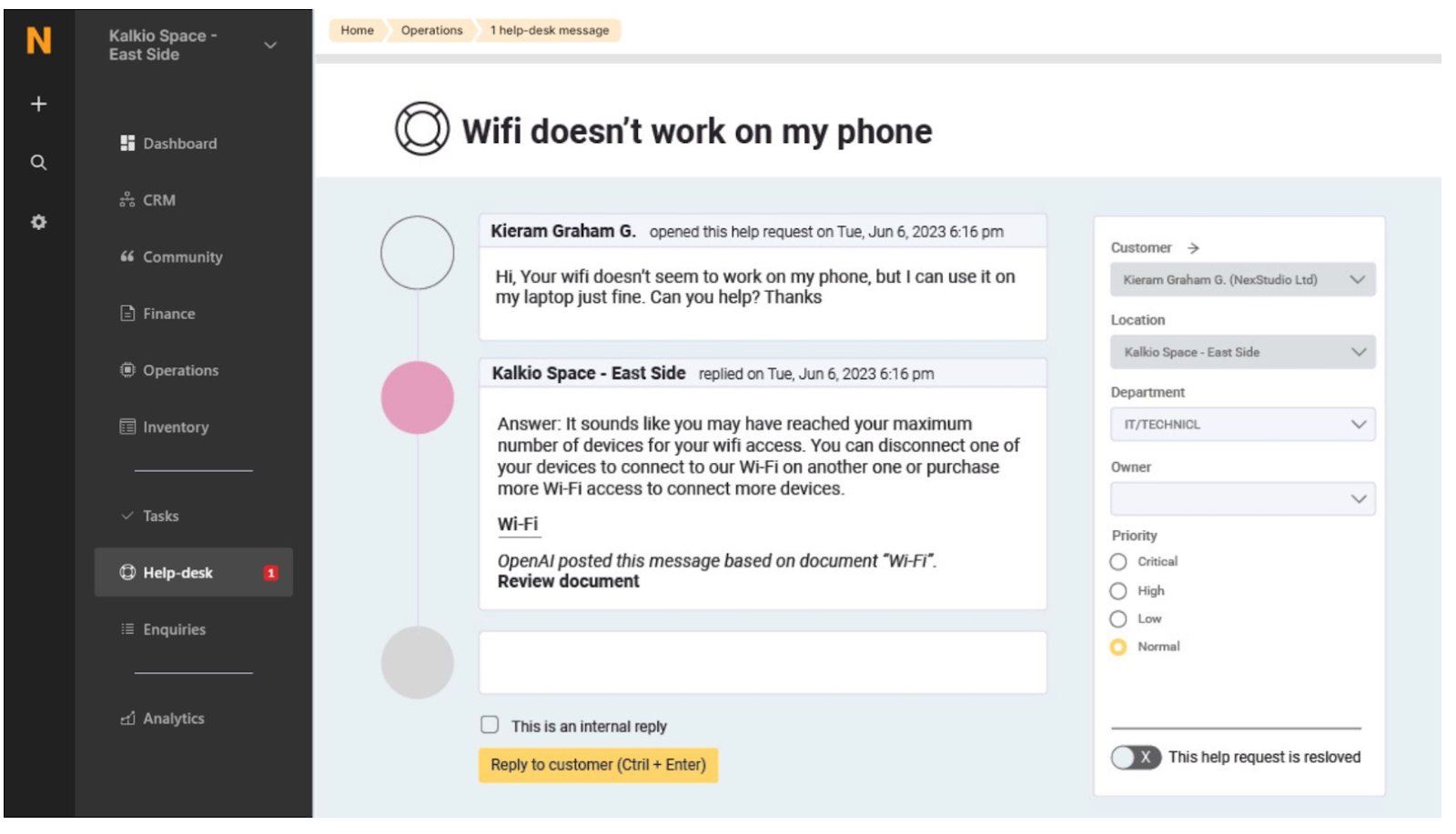How Is AI Changing Coworking Management Software?
Like most industries, AI is impacting coworking in multiple ways.
Coworking operators are harnessing AI-driven smart building technology, advanced analytics and OpenAI models to optimise occupancy levels and drive ROI. Ultimately, AI can help coworking managers meet members’ needs and spend more of their valuable time on the human aspects of the role – like building a community.
From help desk support to generating ideas for events, let’s take a closer look at how AI is influencing coworking management software.
1. AI for help desk support
OpenAI is the AI research and deployment company behind ChatGPT and other models, which are, according to ChatGPT itself, “designed to understand and generate human-like text, making them useful for a wide range of applications, from language translation and content generation to virtual assistants and more.
OpenAI is the AI research and deployment company behind ChatGPT and other models, which are, according to ChatGPT itself, “designed to understand and generate human-like text, making them useful for a wide range of applications, from language translation and content generation to virtual assistants and more.
Nexudus recognises the opportunities OpenAI presents, particularly in relation to help desk automation. Designed to transform help desk support within coworking, Nexudus announced the addition of its new OpenAI integration feature in July 2023.
The traditional manual help desk model poses a few challenges – first, it relies on individual employees possessing a comprehensive knowledge of how their coworking space operates from technical, operational, and community perspectives.
Employees specialising in ‘community’, for instance, might not possess the knowledge required to respond to queries relating to technology, and have to delegate the query to a colleague. This is time-consuming for both the employee and the member who is awaiting a response.
Through the power of Open AI integration, members receive an instant reply and employees can focus on more fulfilling, value-added tasks.
As well as the efficiency gains instant help ticket resolution brings, this new approach to help desk management ensures 24/7 availability, providing support for members across different time zones and those submitting tickets outside of ‘working hours’.
Here’s what the Nexudus OpenAI integration looks like:
 Nexudus OpenAI integration
Nexudus OpenAI integration
So, how does it work?
Nexudus’ OpenAI integration uses pre-entered FAQ data stored in the coworking operator’s coworking management software, which advanced AI algorithms then interpret to provide accurate and personalised answers to common queries.
Although Open AI offers many advantages, it is only as effective as the data it reads and synthesises to produce its responses. It is important for coworking operators to provide their coworking management software – in this case, Nexudus – with accurate, detailed and up-to-date FAQ information.
Nexudus customers can head to the OpenAI knowledge page to learn how to start implementing and using OpenAI for help desk support.
2. AI for advanced analytics
While analytics relies on business intelligence to report and query, advanced analytics uses sophisticated AI-powered tools, such as machine learning, to examine data and reveal insights, make predictions or provide recommendations.
Nexudus’ coworking management software includes a number of advanced analytics features that leverage data and AI. Each is intended to help coworking operators make data-informed decisions on how best to run their workspace and drive ROI.
Take Nexudus’ Trends Dashboard, for example.
It uses predictive models to identify patterns in the occupancy and booking data stored in the coworking operator’s coworking management software.
Equipped with this occupancy knowledge, the system can forecast member engagement and trends in booking demand. The Trends Dashboard can identify the least and most popular resources in the coworking space and provide insights on when resources are likely to be in high, average or low demand in the future.
There’s also Churn and Engagement. The Churn and Engagement dashboard provides coworking operators with simple and actionable insights on how many members are likely to churn within the next 30 days, and how engaged each member is with different resources within the space.
As with the OpenAI integration for help desk queries, the better the data, the smarter the predictive model and the more insightful the predictions.
3. AI for smart building management
AI plays an integral role in the development of smart building systems in coworking spaces. These systems use machine learning algorithms to collect data from a building’s devices, sensors, systems, and services. The goal of most smart building systems is to create environments that are more user and environmentally friendly.
Building sensors collect and measure specific elements within the environment, enabling workspace managers to record and track changes, and trigger actions.
For instance, a sensor placed in a meeting room can measure the temperature at regular points and trigger the air conditioning if the temperature exceeds a threshold. This helps ensure occupier comfort and reduces unnecessary energy usage.
Sensors can also be used to predict and identify maintenance issues before they become more significant – and expensive. Addressing building issues promptly saves money and makes for a better, more comfortable member experience.
Nexudus currently integrates with D12S sensors
4. AI for generating ideas
Coworking management software allows workspace operators and managers to add content to their website, send automated emails to prospective new members, and newsletters to subscribers. It also helps them to nurture the community by creating, promoting and selling tickets to events for both members and non-members.
However, generating ideas and copy for events and content can be time-consuming and challenging, especially if there isn’t a budget to hire a specialist or outsource to a freelancer. OpenAI models such as ChatGPT and GPT-4 can be used as tools to support the generation of ideas and content.

Here are some ideas ChatGPT produced when we told it to ‘generate ideas for coworking social events’:
Movie Night: Host a movie screening with a popular film or a documentary followed by discussions and popcorn.
Themed Costume Party: Choose a fun theme (e.g., retro, superheroes, favourite TV characters) and have a costume party with prizes for the best costumes.
Cooking or Baking Class: Bring in a professional chef or baker for a cooking or baking workshop where coworkers can learn to prepare a specific dish or dessert.
Language Exchange: Organise a language exchange session where coworkers can teach and learn different languages from one another.
Art and Craft Fair: Showcase the artistic talents of your coworkers by setting up an art and craft fair within the coworking space.
ChatGPT can also be used to create copy ideas for blogs, website content, newsletters, social media, event descriptions and more.
It is important to use these programmes as an aide rather than a replacement for human creativity. The tone of voice, authenticity and originality are important, and members will see through copied and pasted AI-generated content.
Here are some ideas ChatGPT produced when we told it to ‘generate subject line ideas for a coworking newsletter’:
1. "Unlocking August: Your Monthly Coworking Update"
2. "Collaboration Chronicles: What's Happening in Our Coworking Community".
3. "Hot Off the Press: The Latest from [Coworking Space Name]"
4. "Connect, Create, Collaborate: Inside This Month's Newsletter"
5. "The Workspace Word: Your Guide to All Things Coworking"
While these new and evolving AI-powered coworking management software features can enhance the workplace experience for employees and members alike, human interaction and input are still incredibly important. There’s room for both!
Related stories
Why a CRM is Essential for Coworking Spaces (And How to Choose the Best One)
A customer relationship management platform (CRM for short) is what organisations use to manage relationships and interactions with both existing and potential customers. Its primary function is to streamline operations and communications to ensure a smooth customer - and employee - experience, while improving profitability.
How the Right Coworking Software Can Transform Your Coworking Space
We all know that technology solutions are imperative to the day-to-day running of your coworking space, but the right coworking software can take it to the next level. It has the power to transform your coworking space into a highly profitable business, all while building a vibrant and engaged community. Let’s explore how the right tools can transform your coworking space.
New in Nexudus: Reduce no-shows & improve team bookings in your coworking space.
Meeting rooms are at the heart of collaboration in coworking spaces. Whether it's a brainstorming session, a client meeting, or a team catch-up, having a simple and efficient way to book and manage meeting rooms makes all the difference. But let’s be honest—there’s always room to improve the experience for your members.
Unlock New Revenue Streams with Our New Virtual Offices Module
The popularity of remote and hybrid working has prompted many organisations to rethink the way they utilise office space. Many have swapped their large, static HQs for more flexible satellite solutions that can accommodate a disparate workforce.
ViDA Compliance Guide: 8 Essential Steps for Coworking Spaces in the EU
Now that 2025 has arrived, the European Union's VAT in the Digital Age (ViDA) initiative is becoming a key topic for coworking spaces operating in the EU. But don’t panic—ViDA will be introduced gradually, with key changes taking effect from 2028. This major VAT reform aims to modernize tax reporting, combat fraud, and streamline compliance through mandatory e-invoicing and real-time digital VAT reporting for certain transactions.
Harnessing AI to Help Coworking Operators Understand Their Communities Better
After more than twelve years in the coworking industry, we’ve seen the movement evolve at an incredible pace, especially in recent years. Spaces have grown larger, making it harder for operators to truly connect with their communities. At the same time, expectations for higher service standards and increasing competition mean that creating tailored experiences and fostering long-term member engagement is more important than ever.
What Is Workplace Management and Why Does It Matter?
There has always been a need for workplace management – the process of organising and optimising physical spaces, resources, and operations to support people’s needs. But, as 28% of UK working adults were reported to work in a hybrid capacity last autumn (by the Office for National Statistics), the question of ‘why workplace management matters’ is more critical than ever. Let’s look at the workplace management benefits for your operations.
Exploring Coworking Software in 2025: 10 Key Nexudus Features
From automating daily processes to supporting your team in building a thriving community and boosting revenue for your business – coworking technology couldn’t be more impactful for flexible workspace operations. But with so many tools available, selecting the right tech stack for your coworking business can be overwhelming.
Unlock Your Team’s Potential with the New Nexudus Academy
As the coworking industry continues to grow and evolve, so does the Nexudus platform. We always strive to develop new features and enhance existing ones to make your job easier. When new features are introduced, there is a need to learn how to best leverage them for your space.
From Startup to AI-Powered Coworking Software Company: The Nexudus Journey
When we first launched Nexudus, we were a small, tightly-knit team wearing multiple hats—from sales to implementation and customer support. In those early days, if a customer had a question, there was a good chance that the person answering it was also the one who had built that particular feature.

